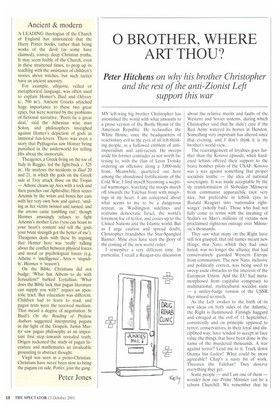Ancient & modern
A LEADING theologian of the Church of England has announced that the Harry Potter books, rather than being works of the devil (as some have claimed), convey deep Christian truths. It may seem feeble of the Church, even in these straitened times, to prop up its teaching with the assistance of children's stories about witches, but such tactics have an ancient ancestry.
For example, allegoria, veiled or metaphorical language, was often used to explain Homer's Iliad and Odyssey (c. 700 BC). Ancient Greeks attached huge importance to these two great epics, but were worried by the problems of fictional narrative. 'Poets lie a great deal,' said the Athenian wise man Solon, and philosophers inveighed against Homer's depiction of gods as immoral fun-lovers. There was even a story that Pythagoras saw Homer being punished in the underworld for telling fibs about the immortals.
Theagenes, a Greek living on the toe of Italy in Reggio, led the fight-back c. 525 BC. He analyses the incidents in Iliad 20 and 21, in which the gods on the Greek side at Troy attack those on the Trojan —Athene cleans up Ares with a rock and then punches out Aphrodite; Hera seizes Artemis by the wrists and boxes her ears with her very own bow and quiver. 'smiling as her victim twisted and turned, and the arrows came tumbling out'; though Hermes amusingly refuses to fight Artemis's mother Leto ('you can boast to your heart's content and tell the gods your brute strength got the better of me'). Theagenes deals with these by arguing that Homer here was 'really' talking about the conflict between physical forces and moral or psychological forces (e.g. Athene = 'intelligence', Ares = 'stupidity', Hermes = 'reason).
On the Bible, Christians did not budge: 'What has Athens to do with Jerusalem?' barked Tertullian. 'What does the Bible lack that pagan literature can supply you with?' argues an apostolic tract. But education was different. Children had to learn to read, and pagan texts were the received medium. That meant a degree of negotiation. St Basil's On the Reading of Profane Authors suggested interpreting pagans in the light of the Gospels. Justin Martyr saw pagan philosophy as an important first step towards revealed truth; Origen reckoned the study of pagan literature and mathematics an invaluable grounding in abstract thought.
Virgil was seen as a proto-Christian. Christians have never been slow to bring the pagans on side. Potter, join the gang.
Peter Jones


























































































 Previous page
Previous page